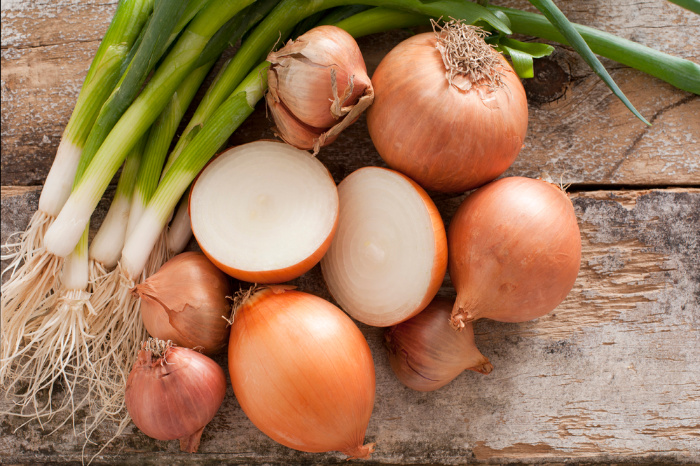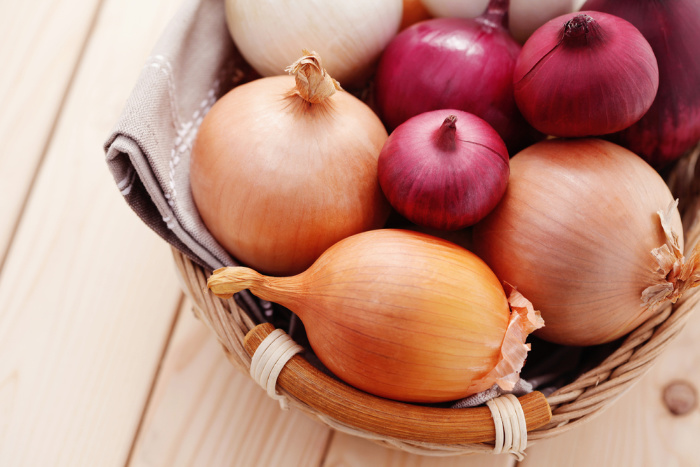Onions: Everything You Need to Know

When you were a kid you probably weren’t sold on onions for any number of reasons. But as you’ve grown older, you’ve probably discovered the many wonderful ways that you can enjoy them. Onions: everything you need to know.
Onions can be eaten raw in a salad or on top of a juicy burger, but they can also be caramelized, sauteed, and enjoyed in so many other ways as well.
Beer battered onion rings are also phenomenal. But did you know that onions contain several nutrients that provide you with amazing health benefits?
It’s true. Here’s more on onions and everything you need to know about them.
Onions: Everything You Need to Know

It’s the sulfuric compounds that are present in onions that cause you to cry when you chop them. One solution you could try to lessen the flow of tears is to chill the onion and then cut the root end of the onion last.
Onions were at one time worshipped by the ancient Egyptians, believing that they represented eternity. There’s evidence of them in pictures found within their ruler’s tomb. We’re given the impression that they thought onions would act as good luck for them in the afterlife.
Back in ancient Greece, when some of the first Olympic games were being held, athletes would rub onions all over their bodies, consume several pounds of onions, and would even drink onion juice to strengthen their bodies.
Have you ever suffered from bad onion breath? People often eat parsley to help with this.
Did you know that New York City wasn’t always called the Big Apple? At one point it was called the Big Onion because of the city’s size and many layers.
Basic Info
The onion (Allium cepa) is the cultivated species that comes from the genus Allium. Garlic, leek, shallot, chive, and the Chinese onion are all closely related to the onion.
Each of them, like the onion, have rather pungent flavors, and also medicinal benefits as well. Onions come in all different shapes, sizes, colors, as well as flavor.
Early History
Several historians and archeologists have speculated that onions originated somewhere in Central Asia, while others are led to believe that they originally came from Iran and West Pakistan.
While the geographical location at this point may be inconclusive, we can be certain that they have been around for several thousands of years. Long before writing and regular farming were developed.
Onions were first cultivated roughly 5,000 years ago, and may have even been one of the first cultivated crops because of just how durable and long-lasting they were.
Onions were also found to be a food that could sustain human life, with their high water content. They could also be used by drying them out and preserving them when food was harder to come by.
Varieties
There are 21 different types of onions out there, but they fit into two categories, dry and green onions. Here’s a look at some of the most common that are available.
Yellow
Yellow onions are surrounded with papery brown skin and white flesh on the inside. They have a strong aroma and flavor. They’re a good option when you go to make French onion soup.
Sweet
The sweet onion is larger, though slightly flatter, than the yellow onion, and of course, much sweeter. Very quickly you will see that they contain more sugar.
It’s the perfect onion to use for caramelizing, and also for making beer-battered onion rings
White
White onions have a sweeter and milder taste than yellow onions and have a papered white skin around them. White onions go nicely in homemade salsa and guacamole recipes.
Red
Red onions have a mild and sweet flavor, and can be eaten raw. They go great in salads, as well as on burgers and sandwiches.
Shallots
Shallot onions are small in size, with brown skin and purple flesh. They have multiple lobes very similar to garlic and its cloves. They have more of an intense flavor and can be minced extremely fine.
Nutrition Facts
Onions are considered to be a nutrient-dense food. This means that they are filled with several vitamins, minerals, and antioxidants, while being low in calorie intake. They contain large amounts of vitamin C, B6, as well as manganese.
Onions also have smaller amounts of calcium, folate, iron, potassium, magnesium, phosphorus, and the antioxidants sulfur and quercetin. All of these provide you with several health benefits that cannot be overstated.
Health Benefits
May Prevent Cancer
Consuming onions on a more regular basis can actually help to reduce the risk of certain types of cancer. This is more true with particular cancers such as the stomach and gastrointestinal tract.
There have been studies done over the years that have shown that onions can help to inhibit cancer cell growth, due to several compounds that they have.
One of them is called organosulfur, which can suppress the growth of a tumor because of its antioxidant properties. Researchers also make it clear that eating allium vegetables does not prevent cancer on its own, but partners with other healthy lifestyle choices that work alongside it.
Benefits Your Heart
Onions have compounds and antioxidants that fight inflammation, protect against blood clots, and lower cholesterol levels. This may even lower the risk of heart disease.
Studies have shown that foods that contain quercetin (like onions), help to reduce blood pressure significantly.
Promotes Skin and Hair Health
Onions are an excellent source of vitamin C, which helps the body to produce collagen. It’s the collagen in our bodies that helps to give skin and our hair a healthier structure.
Lowers Blood Pressure
The skin of onions contains a compound that is known as quercetin, which is known to help lower blood pressure. Further studies need to take place with onions on this matter however, because it was a quercetin extract in supplement form that produced these results.
Helps Control Blood Sugar Levels
Consuming more onions may help to lower blood sugar levels in people. This is especially good news for patients that have diabetes or prediabetes. The sulfuric and quercetin compounds in them are what give onions the antidiabetic effects that they possess.
Provides a Boost for Gut Health
Onions have a decent amount of fiber and prebiotics. Your body’s gut bacteria break them down and turn them into what are called short-chain fatty acids.
These acids go on to boost our immune systems, strengthen our gut health, as well as improve digestion.
Antibacterial Properties
Quercetin once again comes to our rescue and helps to fight against several different types of bacteria that can be very dangerous. Bacillus cereus, escherichia coli (E. coli), and staphylococcus aureus are just a few of them that quercetin can battle with and inhibit their growth.
Final Word
Not only are onions so tasty and can be enjoyed in a number of ways, but they also contain several health benefits that simply cannot be ignored. They may help to reduce the risk of heart disease and certain types of cancers.
Here are a few last-minute onion recipes for you to check out. What did you find most surprising about onions and their many amazing benefits?
What did you think about this resource called onions: everything you need to know? Please keep stocking up when you can, we will need it sooner than later. May God bless this world, Linda
Homemade Dehydrated Onions and Onion Powder
Everything You Should Know About Growing Onions
Copyright Images: Onions Deposit photos_42699945_s-2019, Onions In A Basket Deposit photos_8696609_s-2019
The post Onions: Everything You Need to Know appeared first on Food Storage Moms.
